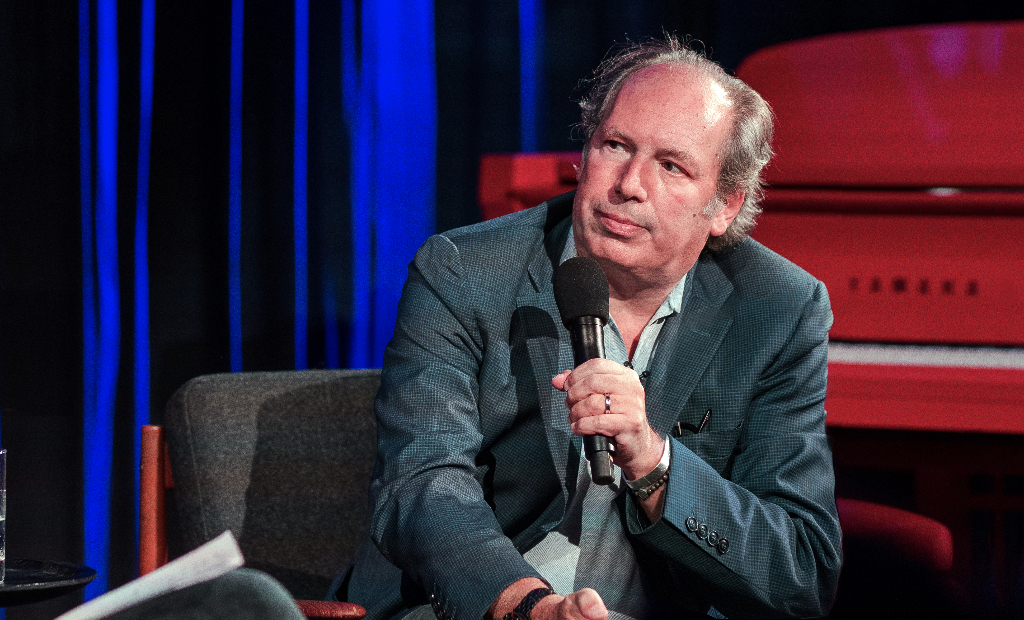Hans Zimmer opens up about his career at intimate Bafta talk:”Things took off the night that Barry Levinson knocked at my door”

As part of Bafta’s Conversations with Screen Composers series, last night’s event saw film lovers fill the Elgar Room at the Royal Albert Hall for a career retrospective with Oscar-winner and internationally acclaimed composer Hans Zimmer. With Tommy Pearson as host, the musical journey kicked off in chronological order, all the way from Rain Man to the more recent collaborations with Christopher Nolan, and the live performance tours around the world.
From the moment Zimmer sat on his chair – next to a sadly untouched red piano – the audience were treated to anecdotes from the early days, the first of which was the one that marked a before and after in his career. The German composer started off working on independent British films, A World Apart among them; Barry Levinson’s wife, Diana, had fallen head over heels for the movie’s score, which brought the director on a late, gloomy night in London knocking on Zimmer’s door to ask him to join the crew of his very first Hollywood hit: Rain Man. The result was a wonderfully eclectic and incredibly original score that introduced Cuban rhythms into a road-trip movie for the first time – a sound that later influenced many other composers.
It is rather surprising that one of the finest musicians working in film today can have such a humble approach to his own art and such awareness of his roots – which have often been the main inspiration for the masterpieces he’s been bringing to life for over 30 years. A great example of this is his Oscar-winning score from The Lion King. Zimmer went on to explain how the idea of producing music for an animated feature with lions wasn’t necessarily on his list of preference when he first received the offer of taking part in the project. However, a combination of circumstances made the experience beyond gratifying and, needless to say, immensely successful.
Among them was the experience of having to write music for the famous scene where Mufasa (voiced by the legendary James Earl Jones) dies by the hands of his brother Scar (voiced by Jeremy Irons); it was the first time a Disney movie would dare to expose such a serious matter to kids. Zimmer also had to deal with the death of his own father at a very young age, making the exquisite piece To Die For perhaps even more meaningful and transcendental.
From then on, the scores he has crafted have increasingly become a reference in film and a synonym with quality and new trends. Hans Zimmer pioneered the use of many synthesisers and the more widely recognisable deep, punchy horn sound that most action films utilise for the more dramatic sequences and trailers. The music of Gladiator, The Dark Knight Trilogy and Inception made him an icon, but the German maestro still pursues creativity. He took Interstellar as a challenge to do something completely new and revolutionary: to break with the past, he used a letter Nolan sent to him as the sole source of inspiration for the organ melody (which was recorded in a London church) that recurs throughout the film. Then it was Dunkirk, an entirely different challenge: rough and tough.
Zimmer also spoke about working with the Scott brothers and their different approaches, Tony being the romantic one and Ridley the more pragmatic. During a final Q&A with the audience, the composer gave credit to Benjamin Wallfisch for doing most of the work on the Blade Runner 2049 soundtrack, his latest success.
Maria Barrios
Photo: BAFTA/Alecsandra Dragoi
For further information and future events visit the Bafta’s website here. For the Royal Albert Hall visit here.





















Facebook
Twitter
Instagram
YouTube
RSS